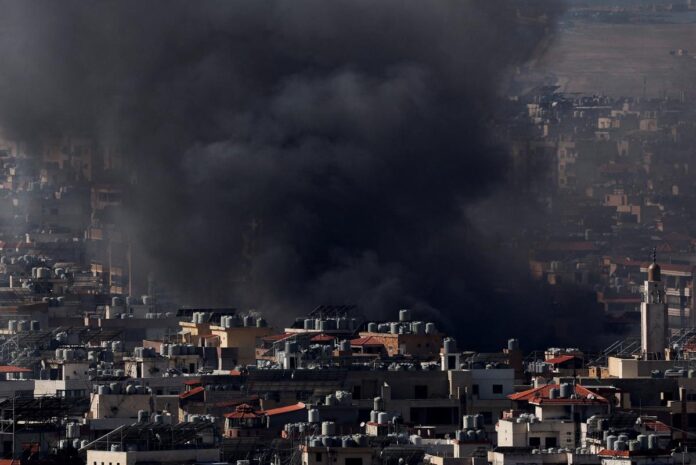In a recent escalation in Middle Eastern tensions, India expressed deep concern following Israel’s military strikes on Iran, underscoring the potential for broader regional instability. As hostilities intensify, India’s call for restraint and diplomatic resolution emphasizes the urgent need for de-escalation in a region already fraught with longstanding political and military complexities. But why has this clash ignited now, and what could it mean for regional dynamics?
Rising Tensions Between Israel and Iran: What Prompted the Latest Strikes?
The recent escalation can be traced back to October 1, when Iran reportedly launched a missile strike that Israel viewed as a direct threat. In response, Israel conducted retaliatory airstrikes, targeting multiple military installations within Iran. The Israeli Defense Forces (IDF) confirmed that they deployed several waves of jet strikes aimed at missile factories and strategic sites critical to Iran’s defense network. This move has since been followed by heightened rhetoric and military posturing on both sides, amplifying the sense of instability across the Middle East.
Iran has responded with a dual message—while asserting its right to self-defense, its foreign ministry also indicated a rare tone of responsibility toward regional peace. “We recognize our obligations toward regional peace and security,” the ministry stated, contrasting its typical defiant stance in prior escalations.
India’s Response: Why Is India Concerned?
India’s reaction to the Israel-Iran conflict reflects its vested interest in the stability of the Middle East, a region pivotal to India’s strategic and economic goals. The Ministry of External Affairs (MEA) released a carefully worded statement expressing India’s concerns about the escalating situation in West Asia. “We are deeply concerned by the evolving escalation in West Asia and its ramifications for peace and stability in the region and beyond,” the MEA stated, urging “all concerned to exercise restraint and return to the path of dialogue and diplomacy.”
This response underscores India’s unique position as a country with significant ties to both Iran and Israel. India maintains a strategic partnership with Israel, especially in defense technology and intelligence-sharing. Simultaneously, Iran remains a vital source of energy, with India importing a considerable portion of its oil supply from Iran. Therefore, maintaining balanced diplomatic relations and regional stability is crucial for India’s interests.

How Does This Affect Regional Peace and Security?
The ongoing confrontation between Israel and Iran has far-reaching implications, particularly for neighboring countries in the Middle East. Iran’s mention of its right to defend itself, coupled with high-level meetings within Tehran to plan a possible response, points to the potential for further escalation. Such tensions could draw in additional actors from across the region, exacerbating an already delicate balance of power.
Furthermore, this situation is complicated by Iran’s role in various proxy conflicts across the Middle East, where it has supported groups that oppose Israeli influence, such as Hezbollah in Lebanon. Israel has expressed its intentions to counteract Iran’s influence and support for armed groups in neighboring countries, adding a complex layer to their bilateral hostilities.

India’s Diplomatic Stance: Advocating Dialogue Over Conflict
Given the historical volatility of the Middle East, India’s diplomatic appeal is grounded in the understanding that dialogue remains the most viable solution to avoid prolonged conflict. The MEA emphasized the importance of returning to diplomacy over military actions, stressing that “the ongoing hostilities are to nobody’s benefit, even as innocent hostages and civilian populations continue to suffer.”
India’s neutral position also speaks to its broader foreign policy approach, often characterized by strategic non-alignment and calls for peaceful resolutions in international conflicts. By urging restraint, India hopes to prevent a further humanitarian crisis in the Middle East, which could have a domino effect on regional and global security.
The Iranian Perspective: National Defense or Aggression?
Iran’s stance on the attacks reflects a calculated balance between defense and regional diplomacy. The Iranian foreign ministry defended its actions as a legitimate exercise of its right to protect national sovereignty, yet stopped short of escalating with more aggressive language. Tehran’s response to Israel’s airstrikes was relatively restrained, with officials describing the damage as “minimal” and localized. Two Iranian soldiers lost their lives, and the targeted areas included Revolutionary Guard bases near the capital, Tehran.
For Iran, maintaining its defensive posture while avoiding all-out war is a nuanced act, as the country seeks to uphold its influence in the region without inviting extensive military intervention from the West or its regional rivals. Iran’s capacity to navigate this situation carefully will likely influence how other regional players perceive its actions and react.
Broader Implications: How Could This Shape the Future?
As Israel and Iran continue their hostilities, the potential for escalation looms large, risking destabilization in a region that has long been a geopolitical hotspot. For India, this scenario underscores the importance of stability in West Asia, as India’s economic and security interests are intricately linked to the peace and prosperity of this region. With a sizable expatriate population in the Gulf and substantial trade routes passing through this area, India is deeply invested in preserving peace.
The involvement of countries like the United States could also add complexity, especially as the US has historically backed Israel while remaining cautious in dealings with Iran. In this light, India’s call for diplomatic engagement aligns with a broader international desire to avoid another protracted conflict in the Middle East. Such conflicts not only disrupt economic flows but also generate ripple effects that reach far beyond the borders of the nations directly involved.
Conclusion: Navigating a Delicate Balance
India’s appeal for calm and dialogue amidst escalating Israel-Iran tensions encapsulates its diplomatic philosophy: advocating for peace, prioritizing dialogue, and maintaining balanced relations with complex allies. As Iran asserts its defense rights and Israel pursues its security objectives, the stakes remain high for regional and international stability. India’s stance reflects its understanding of these delicate dynamics and its commitment to fostering peace in one of the most strategically significant regions on the globe.
By urging restraint, India not only reinforces its diplomatic voice on the global stage but also underscores the universal need for stability. With the Middle East’s situation at a critical juncture, India’s call for a diplomatic resolution serves as a reminder of the importance of dialogue and cooperation in an increasingly polarized world.

